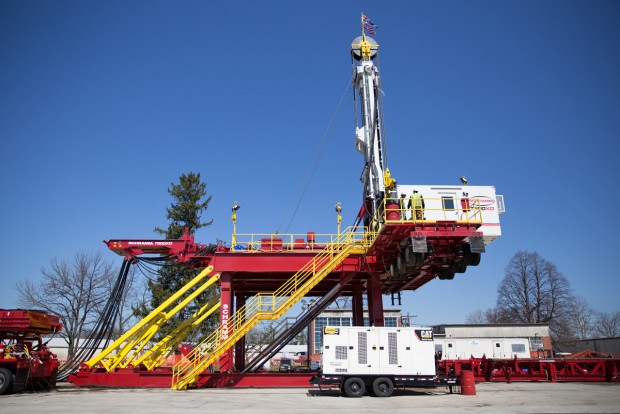PennFuture urges township to scrap gas-drilling ordinance
-
Jon Hurdle

Lindsay Lazarski/WHYY
PennFuture is challenging a local ordinance that allows gas rigs like this in all zoned districts.
An environmental group is challenging a zoning ordinance that allows gas drilling throughout a southwest Pennsylvania township, arguing that the measure is unconstitutional, and violates a state Supreme Court ruling that struck down part of the state’s controversial Act 13 oil and gas law.
PennFuture says the ordinance by Mount Pleasant Township in Washington County violates the right to due process under the U.S. and Pennsylvania Constitutions, and prevents residents from enjoying clean and air and water as required by the state Constitution, because it permits gas drilling in all seven zoned districts.
The environmental group sent a legal notice on May 27 to the township’s zoning hearing board, which approved Ordinance 105 Chapter 200 in 2006 after Pennsylvania’s first Marcellus Shale gas well was drilled in the township by Range Resources.
The challenge says the ordinance allows oil and gas wells in all parts of the township including rural, suburban and residential areas that were not previously zoned for industrial use, and allows compressor and metering stations in several areas.
It also says the township’s Board of Supervisors declared the ordinance “substantively invalid” in 2013 but has not taken action to cure that invalidity since.
The presence of gas development in zones that were previously zoned residential is at odds with the nature of the township, said George Jugovic, an attorney for PennFuture.
“Citizens, who moved to the area for its rural and agricultural setting, want the township to uphold the character of their community,” Jugovic said in a statement. “The past eight years of gas development have shown how the industrialization of the township has had a disparate impact on area residents.”
Mount Pleasant is one of about six Pennsylvania townships where PennFuture is involved in legal actions that test whether local authorities can control gas drilling within their bounds, Jugovic said in an interview.
Other organizations are fighting for local control in other jurisdictions such as Middlesex Township in Butler County where a zoning board has approved an ordinance sharply increasing the amount of land available for industrial use such as gas drilling.
Plaintiffs in the Butler County case, including the environmental groups Delaware Riverkeeper Network and Clean Air Council, are appealing to a higher court after losing a battle to have the ordinance struck down by a county court judge.
The issue of local control over gas development was addressed in late 2012 by the Pennsylvania Supreme Court which overturned parts of the wide-ranging Act 13 oil and gas law. The court said the law’s provisions allowing state law to pre-empt zoning codes, and a requirement to allow oil and gas development in all zoning areas, both violated the state Constitution’s Environmental Rights Amendment which guarantees citizens’ rights to clean air, water and scenic values.
Even though the Mount Pleasant ordinance was passed six years before the Supreme Court ruling, it should still comply with the court’s interpretation of the law, Jugovic argued.
He rejected a suggestion that the legal challenge was very late to the game, coming 10 years after the ordinance was passed. He argued that the filing was in fact some three years after the Supreme Court ruling, and that the effects of the gas industry have taken some years to be felt in local communities.
“The boom turns into a bust, and as people gather data and live with the industry, there are disparate impacts that are only now being tracked by people,” Jugovic said.
He said Mount Pleasant was chosen for the new legal effort because, as the location of Pennsylvania’s first Marcellus Shale gas well, it was “symbolic.”
That well was drilled by Range Resources in 2003 and completed in 2004, said Matt Pitzarella, a spokesman for the company. He said Range has “responsibly developed more than 100” Marcellus wells in the township, where 95 percent of the land is leased.
In early 2015, Range withdrew an application to build a well pad near the township’s Fort Cherry School, citing a 43 percent reduction in its capital spending budget.
Pitzarella said the company plans to remain active in the township, and looks forward to future development opportunities.
“We are currently reviewing PennFuture’s filing,” Pitzarella said.
PennFuture called on the zoning board to hold a hearing on its Notice of Substantive Validity Challenge, and argued that the ordinance should be replaced with one that separates gas development from residential and other zoning. If township officials reject the initiative, it will be appealed in the courts, Jugovic said.
“We’re not suggesting that wells that are currently drilled need to be plugged,” he said. “What we’re looking at is local government’s obligation to zone in a rational manner. Similar uses should be allowed in the same area. Gas drilling, in our view and in Pennsylvania Supreme Court’s view, is not compatible with residential development.”
Tom McDermott, an attorney for the township, rejected PennFuture’s assertion that supervisors had substantially invalidated the ordinance in 2013. He said the only part to be invalidated related to impoundments.
He called the legal challenge a “wasteful exercise” that was timed just after the completion of the township’s comprehensive plan. But he predicted that the Zoning Hearing Board would hold a hearing on the challenge, as requested by PennFuture.
















